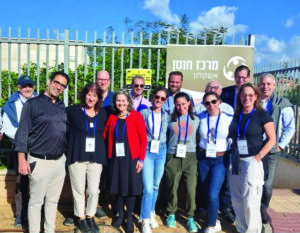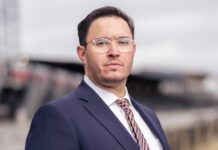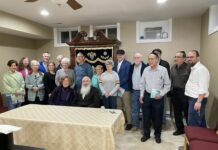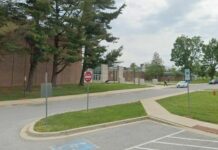
The Associated: Jewish Federation of Baltimore organized a trip to Israel for community leaders, rabbis and elected officials from Nov. 19-21.
The intention of the trip, according to Associated volunteer leader Katie Applefeld, was to learn about the recovery from the Oct. 7 Hamas attack and to show Israelis that “we’re here.”
Applefeld and Rabbi Andrew Busch of Baltimore Hebrew Congregation discussed the journey.
Applefeld
On day one, the Baltimore leaders took in a Jewish Federations of North America briefing on the situation, according to Applefeld. They also visited Magen David Adom to learn about the response to the attack and met with survivors from Kfar Aza, near the Gaza envelope.
Applefeld talked to survivors who were stuck in bomb shelters for “hours and hours,” she said. They kept hearing from community members, who said, “The terrorists are here. The terrorists are there.” One survivor had lived in Kfar Aza for over 50 years. Another was a 13-year-old boy.
“They waited hours, hours, to be rescued. There are some people who can’t go back, won’t go back,” Applefeld said. “And there are many who plan to go back and rebuild.”
On day two, The Associated group met with the mayor of the regional council of Gezer in the center of the country. It’s made up of agricultural communities that have lost workers since the outbreak of the war. The group visited a farm to see the impact firsthand.
Then it spent most of the day in Ashkelon, The Associated’s sister city in Israel. In Ashkelon, schools have been closed since Oct. 7, according to Applefeld.
The Baltimore leaders also visited the trauma center in their partner community, where they learned that it would have to significantly scale up its resources. To Applefeld, the moment reinforced the need for the partnership to continue, and perhaps grow even stronger.
“The amount of scaling up they’re going to have to do to meet the needs is extraordinary,” she said.
The task seems daunting. But meeting it right away was not the purpose of the trip. The important thing was for Baltimore leaders to show their faces, Applefeld said. She said there were two reasons for the trip.
“One was solidarity. These are longstanding partnerships. These are people we have worked with for many years. To show them we’re here, we care, we’re with you,” she said. “It was also to bear witness. Meeting with survivors to hear their stories firsthand.”
After returning, Applefeld realized that first she needed to share the stories of survivors with Americans. Then it would be incumbent upon the Federation to organize a response to meet the needs of the moment.
“I think I got a better sense of what we can do when we go and how we can be helpful. We can organize groups of volunteers to go and do what needs to be done,” Applefeld said. “They need more hands with so many people being called up in the reserves. Farms are suffering. Businesses are suffering. They just don’t have the manpower. I think there’s a real opportunity in the next few months to organize small groups to go.”
During the trip, Applefeld never felt like a tourist.
“Everybody we met said, ‘Thank you for being here. Thank you for coming.’ This felt like family. It really felt like these are my people. We are in this together,” she said.
Busch
Busch said he was moved by the reaction of the Israelis to the Baltimore leaders’ presence.
“How deeply appreciative every Israeli we met was for our being there. Everyone, from just the normal folks we were sitting and talking to, to the people at the hotel, to some of the officials we met,” he explained. “It was straightforward.‘You can’t imagine how meaningful it is for you just to be here.’”
At the same time, Busch took in the immense practical challenge facing Israeli communities right now. Young people have been called up into the reserves. Workers are missing because they’ve gone back to Thailand. Buildings have been hit by rockets.
“We were really focusing on the human and communal side of this,” he said.
Despite the challenge, though, Busch heard about hope. Over and over.
“There is a real sense of the future,” he said. “People who plan on rebuilding their towns and rebuilding their lives.”







